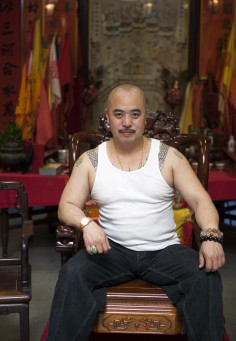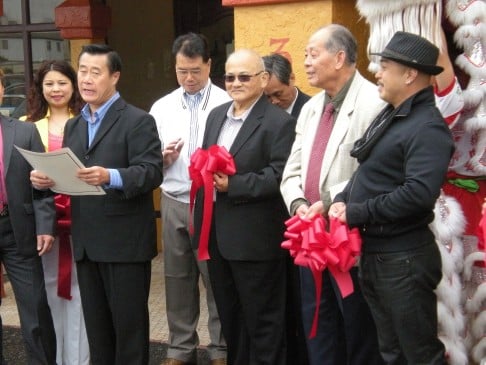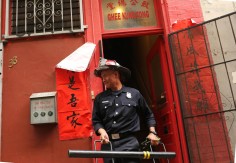Reformed gangster Raymond 'Shrimp Boy' Chow caught in the FBI's net
Raymond 'Shrimp Boy' Chow claimed to have turned his back on life as a gangster with links to Hong Kong triads - but the FBI didn't believe him
PUBLISHED : Thursday, 03 April, 2014, 3:41am
UPDATED : Thursday, 03 April, 2014, 3:41am
Los Angeles Times

Raymond "Shrimp Boy" Chow
When Raymond "Shrimp Boy" Chow walked the streets of San Francisco's Chinatown in one of his natty suits, bright pocket square ablaze, he exuded power.
Almost from the moment he arrived from Hong Kong in 1976 at the age of 16, he was a force in the local underworld, working as an enforcer for a local fraternal club called the Hop Sing Tong, shaking down gambling dens and running prostitution rings, according to authorities and his own accounts.
He once told prosecutors he was in charge of all Asian crime in San Francisco, and admitted that he partnered with a leader in an ancient triad group. But after three stints in prison, he said he was going straight.
At 1.65 metres tall, with a shiny bald head and pencil moustache, Chow swaggered. He spoke to youths at risk about the dangers of gang life, became involved in community politics and claimed to be pitching a movie to Hollywood about his life. Social workers believed his transformation, and soon he was honoured by the likes of San Francisco Mayor Edwin Lee, and US Senator Dianne Feinstein.
"All the criminal past I had, I cannot deny that," he said at a press conference in front of City Hall in 2009. "But today I do not represent crime. I do not represent violence and gangs."
That new persona crumbled in recent days when he was arrested in a sweeping federal corruption investigation - one in which State Senator Leland Yee, a San Francisco Democrat, was charged with conspiring to deal firearms for campaign contributions. Two dozen associates were also arrested.

State Senator Leland Yee, second left, has been charged with conspiring to deal firearms for campaign contributions. Photo: AP
According to the 137-page affidavit made public last week in support of the criminal complaint, Chow, 54, vacillated between claims to undercover agents: that he had truly given up crime, and that he was a crime boss who didn't get his hands dirty since his last prison stint. He allegedly told them that when a member of his organisation kills another, he decided if the killing was justified.
The affidavit alleges that he made introductions and took payments for allowing various acts of money laundering and smuggling to occur.
He was arrested at his girlfriend's house in San Francisco, and faces charges of money laundering, conspiracy to transport stolen property across state lines and conspiracy to traffic in contraband cigarettes. A conviction could bring a maximum prison sentence of 115 years.
Local law-enforcement officials say they never bought Chow's public claims of legitimacy. But they also didn't buy the big-shot international figure he purported to be in more secretive circles of Chinatown.
They suspected he had lost clout in the underworld, living hand to mouth on payments from whomever he was able to scare, according to Ignatius Chinn, a San Francisco police officer who spent two years investigating Chow prior to his 1995 conviction.
"The local gangsters have a saying: 'Follow the shrimp if you don't want to eat,'" Chinn says.
A history of violence
Chow had been something of a colourful caricature of late, parking himself at the Redwood Room near Union Square, chatting with tourists or Silicon Valley newcomers drawn to his gangland tales. A YouTube video called "Meeting Raymond Chow" shows him joking with Norwegian tourists.
He talked to reporters and was the subject of an episode of the History Channel show Gangland.
In that episode, he said he first joined a gang in his native Hong Kong at age nine, when he stabbed someone. When he moved to San Francisco, the kung fu devotee quickly made a name for himself as the leader of the Hop Sing Boys.
A gang war erupted in 1977, in part, over the distribution of fireworks. When rivals opened fire in a restaurant where Chow was dining, they killed five people, wounded 11 others and shattered Chinatown's reputation as a safe tourist destination.
Chow escaped unhurt. But the next year he was sentenced to 11 years in prison on armed robbery charges. He was released early but returned to prison for assault with a deadly weapon.
He was back on the streets again in 1989, and the FBI placed wiretaps on him.
In 1992, he and 19 others were charged in a 108-page racketeering indictment for an alleged scheme to bring Asian gangs on both coasts under the umbrella of a triad, the Wo Hop To, in Hong Kong. Chow faced 48 counts, including murder-for-hire, heroin trafficking, conspiracy, violent racketeering and importing firearms. He was convicted on the gun charges and sentenced to more than 23 years in prison.
Chow testified against his partner, Peter Chong, in exchange for a reduced sentence in 2001 and was released in 2003.
Chow had promoted himself as a legitimate businessman ever since. The city gave him a certificate of honour and he received plaudits from Feinstein and other high-level politicians.
His Facebook page has a photo of him with former mayor Gavin Newsom.
"The people who believed him were people from outside the community who found the best in everybody and didn't know what was going on," says Chinn, the San Francisco police officer.
The senior group's executive director, Cathy Davis, feels tricked by Chow. "He really made a bad name for a lot of people we try to honour," she says.
New investigation

An FBI agent during a raid in San Francisco's Chinatown last month. Photo: Reuters
The latest investigation began when an FBI agent posing as an east coast member of the Italian mafia met Chow in May 2010. The agent said he was looking to launder money from various illegal enterprises. According to the affidavit, signed by FBI Special Agent Emmanuel Pascua, Chow told the undercover operative that he could not be involved directly, but would make introductions for him.
By that June, Chow was on a chartered fishing boat off Hawaii with two undercover agents, talking about how he could get military-grade tungsten from China cheaply, among other potential schemes, the affidavit said.
Chow introduced them to political consultant Keith Jackson, a key fundraiser for Yee, to get "inside deals" done, and to other associates. But he continued to say he didn't want to know about any criminal acts.
He said he suspected the Justice Department was watching his every move, and that he was broke, taking US$200 to speak to classes about the "evils of alcohol and drugs".
Chow seemed unable to stop boasting about his power, according to the affidavit. He said he "dropped" the last person to threaten him, that he could move hundreds of kilos of drugs if he wanted to, and that he had mediated disputes between lower-level gang members.
Between March 2011 and December 2013, five associates of Chow laundered a total of US$2.3 million, and took a 10 per cent cut, in a scheme sanctioned by Chow, according to the FBI.
The agents then pushed to get involved in some of the illegal enterprises involving Chinatown gangs. Chow was allegedly paid US$28,000 for three schemes to sell stolen alcohol and cigarettes, and then US$30,000 for facilitating a money-laundering scheme.
As he sat with an undercover agent and George Nieh, a leader of the Wah Ching gang, Chow said, "How am I hanging out with outlaws like this?"
Nieh said, "You are an outlaw too." Chow laughed. "I am innocent," he said, according to the affidavit.
"I don't have no knowledge of the crimes you commit to pay for my meal. That is very bad. I'm still eating though, I'm hungry."
________________________________________________________________________
Gangland link to state politics sees 26 charged in San Francisco
US prosecutors in San Francisco filed federal criminal charges against 26 people in March, accusing them of firearms trafficking, money laundering, murder for hire, drug distribution and dealing in contraband cigarettes.
The defendants include Raymond "Shrimp Boy" Chow, the current dragonhead, or leader, of the San Francisco-based Chee Kung Tong organisation, and California senator Leland Yee.
Chow introduced an undercover FBI agent, posing as a consultant, to Keith Jackson, owner of a San Francisco consulting firm.
Jackson allegedly raised campaign funds for Yee's secretary of state campaign. Yee lost the election. To pay off campaign debt, Yee recommended that a health contract be signed in exchange for receiving a US$10,000 campaign donation, the FBI said.
